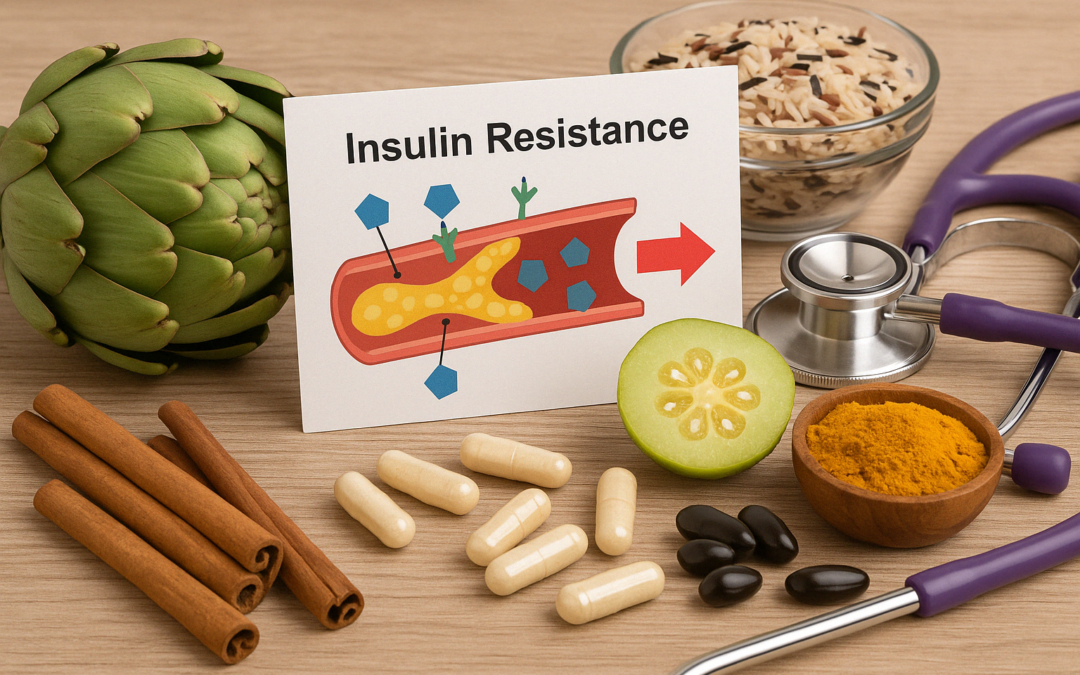Insulin Sensitivity: Insulin Resistance occurs when cells become too resistant to insulin. This results in elevated blood sugar levels, leading to weight gain, prediabetes, and type 2 diabetes.
- Losing weight with insulin resistance is more difficult because the body stores excess blood sugar as fat.[i]
Insulin resistance is an increasing metabolic concern affecting millions of people globally. It often quietly contributes to numerous chronic health issues. Fortunately, early intervention—mainly through diet, lifestyle changes, and evidence-based natural supplements—can enhance insulin sensitivity and restore healthy metabolic function.
What Is Insulin Resistance?
Insulin is a hormone produced by the pancreas that helps regulate blood glucose by allowing cells to absorb and use sugar for energy. Insulin resistance occurs when the body’s cells become less responsive to insulin, forcing the pancreas to produce more to achieve the same effect. Over time, this leads to elevated insulin and glucose levels, creating a dangerous metabolic imbalance.
How Does Insulin Resistance Develop?
Several factors can contribute to the onset of insulin resistance:
- Poor diet: High intake of refined sugars, processed foods, and unhealthy fats
- Sedentary lifestyle: Lack of physical activity reduces glucose uptake by muscles
- Chronic stress: Elevated cortisol can interfere with insulin signaling
- Sleep disturbances: Poor sleep is associated with reduced insulin sensitivity
- Obesity: Excess fat, particularly visceral fat, impairs insulin receptor activity
- Genetics: Family history plays a role in susceptibility
The Vicious Cycle
When insulin resistance is left unchecked, it often progresses to prediabetes and type 2 diabetes. Chronically high insulin levels also contribute to fat accumulation, especially around the midsection, further perpetuating insulin resistance.
Health Conditions Linked to Insulin Resistance
Insulin resistance is at the core of metabolic syndrome, a cluster of conditions that increase the risk of cardiovascular disease and type 2 diabetes. Other health issues associated with insulin resistance include:
- Obesity
- Polycystic Ovary Syndrome (PCOS)
- Non-Alcoholic Fatty Liver Disease (NAFLD)
- Hypertension
- Dyslipidemia (high triglycerides and low HDL cholesterol)
- Cognitive decline and Alzheimer’s disease (sometimes referred to as “type 3 diabetes”)
Can You Reverse Insulin Resistance?
Yes—especially in the early stages, insulin resistance is highly reversible. The most effective strategies include:
- Diet: Prioritize whole foods, fiber, healthy fats, and low glycemic index carbohydrates
- Exercise: Regular resistance and aerobic training improve glucose uptake
- Sleep hygiene: Aim for 7–9 hours of restful sleep
- Stress management: Practices like meditation and yoga help regulate cortisol
- Weight management: Even modest weight loss (5–10%) improves insulin sensitivity
Natural Supplement Ingredients That May Help
Several natural ingredients have shown promise in reducing insulin resistance and supporting glucose metabolism. Here are some of the most effective and well-studied options:
Insulin Sensitivity/Maintenance:
- Artichoke leaf extract (Altilix)- Improves insulin resistance assessed using the HOMA-IR index.[ii]
- Berberine (Berbevis®)- improves insulin resistance, increases AMPK[iii]
- Cinnamon (Cinnulin PF®)- reduces insulin resistance and improves insulin sensitivity[iv]
- Fenugreek (Fenuflakes)- provides fiber and added gut health support, aiding blood sugar stabilization.
- Garcinia cambogia (SuperCitriMax)- ROS, decreases insulin resistance, cytokines, leptin[v]
- Irvingia gabonensis seed extract (IGOB-131®)- Clinical trial evidence suggests improved insulin sensitivity markers.[vi]
Insulin resistance is a precursor to chronic health issues and signals that the body needs support. Through lifestyle changes and targeted natural ingredients, it’s possible to restore insulin sensitivity and reclaim long-term metabolic health. Combining diet, exercise, and scientifically supported supplements may offer a practical path forward for those seeking a proactive, natural approach.
References:
[i] Kahn BB, Flier JS. Obesity and insulin resistance. J Clin Invest. 2000 Aug;106(4):473-81. doi: 10.1172/JCI10842. PMID: 10953022; PMCID: PMC380258.
[ii] Castellino G, Nikolic D, Magán-Fernández A, Malfa GA, Chianetta R, Patti AM, Amato A, Montalto G, Toth PP, Banach M, Cicero AFG, Rizzo M. Altilix® Supplement Containing Chlorogenic Acid and Luteolin Improved Hepatic and Cardiometabolic Parameters in Subjects with Metabolic Syndrome: A 6 Month Randomized, Double-Blind, Placebo-Controlled Study. Nutrients. 2019 Oct 25;11(11):2580. doi: 10.3390/nu11112580. PMID: 31731527; PMCID: PMC6893885.
[iii] Cao C, Su M. Effects of berberine on glucose-lipid metabolism, inflammatory factors, and insulin resistance in patients with metabolic syndrome. Exp Ther Med. 2019 Apr;17(4):3009-3014. doi: 10.3892/etm.2019.7295. Epub 2019 Feb 22. PMID: 30936971; PMCID: PMC6434235.
[iv] Ziegenfuss TN, Hofheins JE, Mendel RW, Landis J, Anderson RA. Effects of a water-soluble cinnamon extract on body composition and features of the metabolic syndrome in pre-diabetic men and women. J Int Soc Sports Nutr. 2006 Dec 28;3(2):45-53. doi: 10.1186/1550-2783-3-2-45. PMID: 18500972; PMCID: PMC2129164.
[v] Hayamizu K, Hirakawa H, Oikawa D, Nakanishi T, Takagi T, Tachibana T, Furuse M. Effect of Garcinia cambogia extract on serum leptin and insulin in mice. Fitoterapia. 2003 Apr;74(3):267-73. doi: 10.1016/s0367-326x(03)00036-4. PMID: 12727492.
[vi] Ngondi JL, Etoundi BC, Nyangono CB, Mbofung CM, Oben JE. IGOB131, a novel seed extract of the West African plant Irvingia gabonensis, significantly reduces body weight and improves metabolic parameters in overweight humans in a randomized double-blind placebo controlled investigation. Lipids Health Dis. 2009 Mar 2;8:7. doi: 10.1186/1476-511X-8-7.


